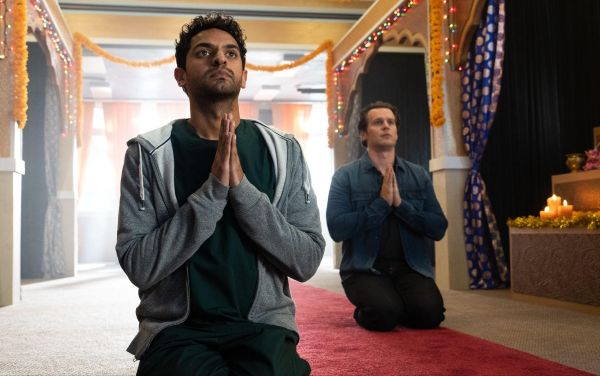
What an absolutely delightful film. In times like these, when everything feels dark, foreboding, and tenuous, stumbling upon a sweet-natured film about love, hope, and connection is, simply put, a gift.
Karan Soni stars as Naveen Gavaskar, a mild-mannered gay Indian doctor. His sister has just gotten married, and his family is pressuring him to follow suit. They are respectful of and curious about his orientation. “How do gays even meet?” his mother, Megha (the priceless Zarna Garg), wonders aloud. His father, Archit, watches Out TV to keep up with the trends. Still, Naveen is too embarrassed and uncomfortable to bring home any of his boyfriends—until he meets Jay (Jonathan Groff), an enthusiastic and oversharing man who was raised Hindu after being adopted from foster care by Indian parents.
Initially, there’s the classic push-pull of an anxious introvert dating an exuberant extrovert (which includes quite a bit of Groff singing). At this stage, the film feels sweet but slight. It never stops being sweet, but it slowly leads viewers into deeper waters.
As Jay meets Karan’s family, it becomes clear that Karan has been given more leeway in choosing a mate than his sister, Arundhathi (Sunita Mani), whose marriage was arranged. And then there’s the fact that Karan never quite got around to telling his parents that Jay is White. As the story expands beyond Karan and Jay, incorporating the arcs of the parents and sister, the film reveals its real theme: how feelings and desires remain hidden because of tradition or simply fear.
While it may seem at first that Karan is the one making the so-called hero’s journey, everyone has something to learn. Jay’s free and open presence creates a seismic shift in Karan’s family dynamic. Pay close attention to Harish Patel as Archit, who initially seems detached and uninterested but, in the film’s best performance, slowly opens up like a radiant flower.
That all sounds like serious stuff, but A Nice Indian Boy knows its job—it is a very funny movie. All the leads have razor-sharp comic timing. The film has the feel of cringe comedy on the surface, with plenty of moments where you want to look away in sympathy for Karan. Yet, viewers will inevitably develop real affection for these characters. They are relatable as they work through their issues—not particularly messily, but certainly honestly.
As for the technical aspects—direction, cinematography, editing—they are relatively straightforward. There’s nothing flashy here, much like many recent comedies made for streaming. But in this case, that’s a strength. This is a story that focuses on its characters, and they are characters you’ll be more than happy to spend an hour and a half with.
















Leave A Comment